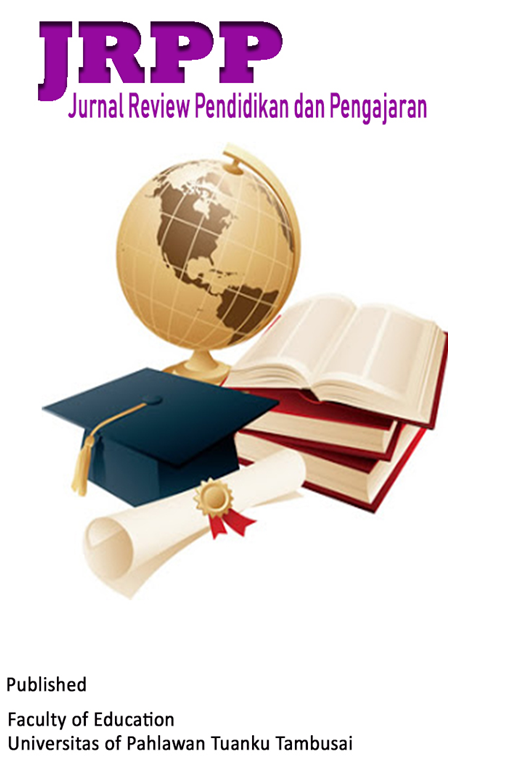TRAINING ON FLOURISHING SPEAKING CLASS THROUGH SHORT STORIES IN MADRASAH ALIYAH NEGERI 1 PROBOLINGGO
DOI:
https://doi.org/10.31004/cdj.v5i6.40767Keywords:
Reading Comprehension, Short Story, Lesson Plan.Abstract
To help the students to master English, Madrasah Aliyah Negeri 1 Probolinggo provides additional activities named English Study Club. On tutors’ guidance, the activities range from reading to speaking. In the initial observations made by the practitioners, it was found that the study club has not yet had a learning activity plan for each meeting, for both reading, nor speaking. It was also found that participants in the club were less enthusiastic in joining speaking activities class. This happened because they were lack of ideas to convey in the speaking session. This community service aims to provide training to tutors at the study club so that they can create an enthusiastic class. The activities in question are reading activities through mastering stories in short stories which can then be used as topics in discussion activities in speaking class. For this reason, this service focuses on training tutors to prepare reading comprehension learning activities using short stories as pre-activities in speaking classes. The expected outcome is that the tutors can overcome the boredom experienced by the English study club participants. Gladly, this aim is on its path of materialization.References
Asmara, I. F. (2018). The Implementation of Before, During, and After Reading (BDA) Strategy to Improve Students’ Achievement in Reading Comprehension of Narrative Text at MTsN 2 Medan. Unpublished thesis. State Islamic University of North Sumatra Medan.
Babashamsi, P., Bolandifar, S., & Shakib, N. (2013). Various Models for Reading Comprehension Process. International Journal of Applied Linguistics and English Literature, 2(6), 150–154. https://doi.org/10.7575/aiac.ijalel.v.2n.6p.150
Castle, A., Rastle, K., & Nation, K. (2018). Ending the Reading Wars: Reading Acquisition from Novice to Expert. Psychological Science in the Public Interest, 19(1), 5–51. https://doi.org/https://doi.org/10.1177/1529100618772271
Dara, D. (2019). Investigating English Reading Comprehension Problems of Cambodian High School Students. American International Journal of Social Science, 8(3), 157–195. https://doi.org/https://doi.org/10/30845/aijss.v8n3p8
Gamboa, A. A. (2017). Reading Comprehension in an English as Foreign Language Setting: Teaching Strategies for Sixth Graders based on the Interactive Model of Reading. Folios, 1(45), 159–175.
Giouroukakis, V. (2016). An Instructional Framework to Support Content and Language Learning for ELLs: BDA. Fakulty Works: Education, 46(2), 22–24.
Hamra, A., Syatriana, E. (2016). Developing a Model of Teaching Reading Comprehension for EFL Students. TEFLIN Journal, 21(1), 27–40.
Kaganang, G. (2019). The Use of Problem-Based Learning to Improve Students’ Reading Comprehension at the First Grade Students of Senior High School 1 if Middle Halmahera. Langua: Journal of Linguistics, Literature, and Language Education, 2(1), 45–53. https://doi.org/https://doi.org/10.5281/zenodo.2588119
Karpf, A. (2019). Before During After Reading: Strategies for English Learners. Midtesol, 3, 1–6.
Mitsigkas, N. (2015). Using Novels in English Language Teaching in Cyprus. Unpublished dissertation. Department of Language and Linguistics University of Essex.
Muhid, A., Amalia, E.R., Hilaliyah, H., Budiana, N., & Wajdi, M. B. N. (2020). The Effect of Metacognitive Strategies Implementation on Students’ Reading Comprehension Achievement. International Journal of Instruction, 13(2), 847–862.
Downloads
Published
How to Cite
Issue
Section
License
Copyright (c) 2024 Tirmidi Tirmidi, Faradila Arsylia Putri, Yanti Khomariyah, Kholifatul Indriyani

This work is licensed under a Creative Commons Attribution-ShareAlike 4.0 International License.














